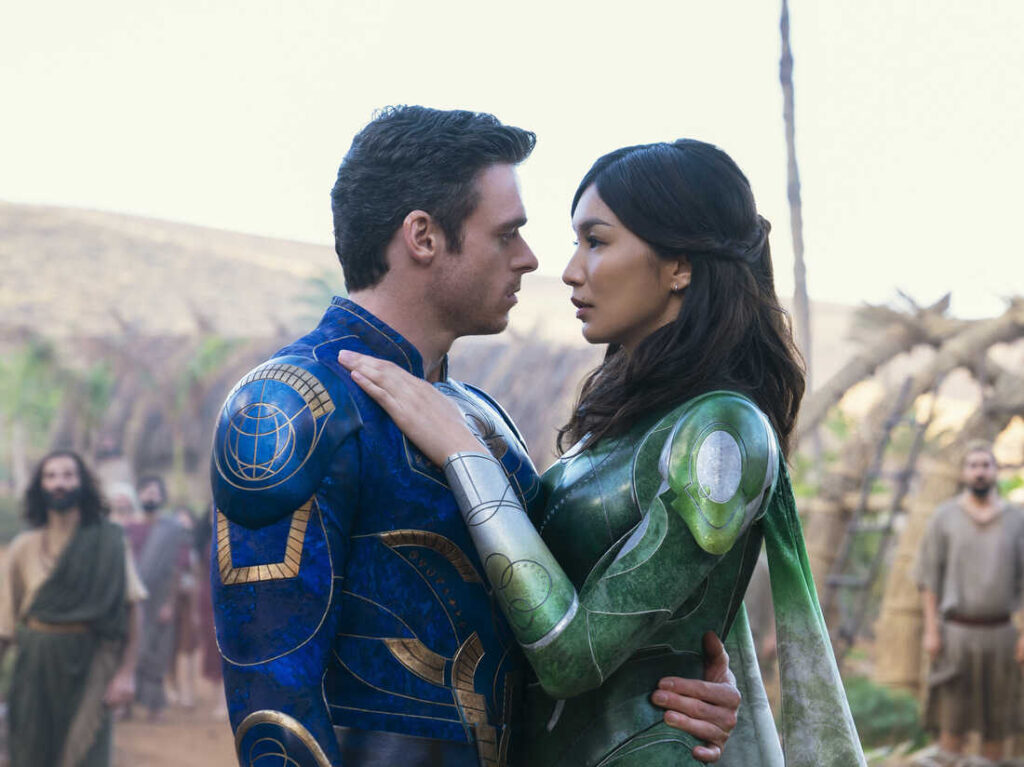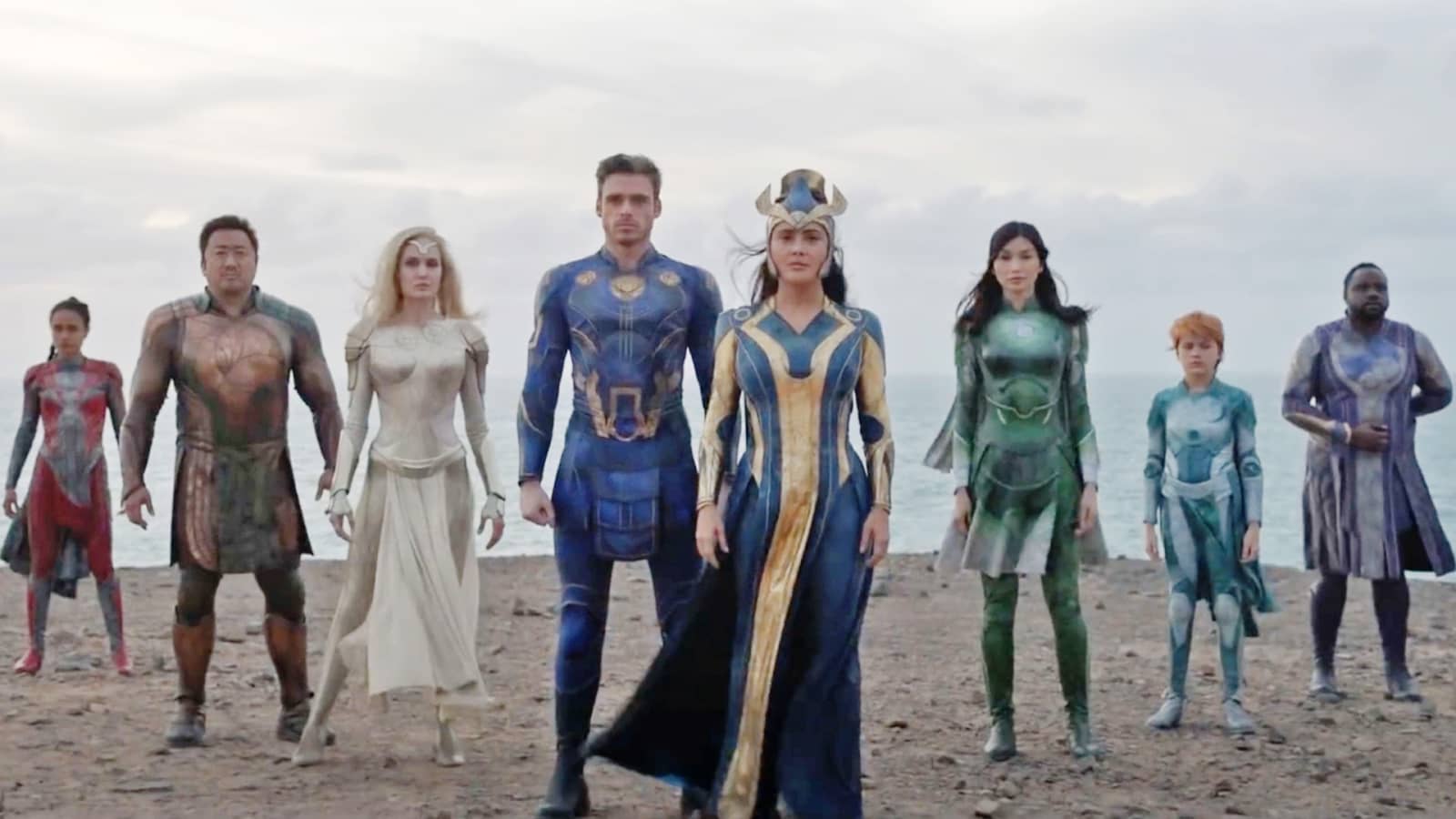The story structure of Marvel’s Eternals is all wrong according to what I’ve been taught.
I love it anyway
If you’ve read any of my articles about writing, you know I’m a stickler for story structure. There are certain storytelling elements that will help a writer craft a compelling story every time. The traditional action-adventure/superhero plot is still based on the time-honored hero’s journey. That means, in basic terms: an inciting incident, the call to action, rising stakes, the dark moment, and the finale. Hopefully, a theme that resonates is built around this plot.
In Marvel’s Guardians of the Galaxy, the inciting incident is Peter’s theft of the Infinity Stone. Peter answers the call by teaming up with a bunch of losers, the stakes rise as the danger of the stone is revealed, the dark moment happens when all seems lost in the crash of the ship, and, finally, the Guardians literally bond, defeat the villain and destroy a planetary threat. The theme is found family, as Peter lost his first one but accepts that loss by playing his mother’s mixtape for his new family.
Eternals does not follow this structure. Yet its themes are compelling and intense, and that’s the reason I love it. It’s essentially a literary family saga containing a dark secret that shatters the family bond. This bond incidentally threatens the world but that’s not the point.
Eternals: The Flaws?
The criticism of Eternals centers on the opening being dull. (Or all of it being dull.)
There’s no real inciting incident. The Eternals simply arrive on Earth and begin saving people from the monstrous Deviants. Moments in time are captured but no one is in any real danger at this point. Instead, the beginning serves to introduce us to the family.
Eternals lacks a villain in any traditional sense. The Deviants are faceless stand-ins that allow for lots of punching and fighting but they’re mostly non-entities. There is one Deviant who has a speaking part. He’s not important save his existence resonates with this theme of buried secrets and their cost. (I wish more had been done with that one.)
The Eternals aren’t searching for any particular plot MacGuffin, like an Infinity Stone. In fact, they’ve given up. They’re not even together any longer as a family until more Deviants show up in the present day and start attacking them.
Instead, the momentum of the story comes from the secrets hidden within themselves and the ones concealed from them. These story questions are (forgive me) eternal ones: Who am I? What is my purpose?
Eternals: It’s a Dysfunctional Family Saga
The only true conflict in this story is the conflict between the Eternals themselves. Their hidden secrets are buried for generations until all is revealed and the truth tears the family apart for good. Given that premise, the structure of the movie makes perfect sense.
The supposedly ‘dull’ prologue is about how the family is formed. The comradeship between them is emphasized and especially the love between Ikaris and Sersi. These are people happy about their lives and their role in saving Earth from the Deviants. All appears well.

And yet….the seeds of the dysfunction are there. Ajax, their leader, clearly knows something that the others do not, the original sin of the family’s existence. She shares this secret with Ikaris. But he cannot share it with anyone else, a secret that eventually tears about his romantic relationship with Sersi.
Druig is frustrated that he has the power to save people from themselves but has been prevented from doing so. He leaves the group to create his dysfunctional version of Paradise. Phastos is eager to teach humanity but he is disillusioned when they make weapons of mass destruction as a result. Sprite wants to grow up. Thena has moments of homicidal rage tied to something she cannot forget—something she does not wish to forget. This is the biggest clue to the deception of their existence. Gilgamesh, out of love, becomes Thena’s caretaker and companion and they live apart from the others. Kingo creates his own fantasy world by disappearing into entertainment. Makkari never finds a real home and instead seems to return again and again to the ship.
Ikaris vanishes from the group altogether.
The family is fractured. But no one save Ajax and Ikaris understands why.
Part 2 of the story begins with Ikaris even returns to Sersi, telling her of a threat that needs every member of the family. The Deviants have returned! They reunite the family. At first, it seems to go well, as they are glad to have found each other again, albeit some more joyful than others. Losses come too, especially Ajax, the leader, and Gilgamesh, Thena’s soulmate and caretaker.
It seems the Deviants are more of a threat than ever.
Except they’re not the real threat. The real threat is the secret that blows the family apart.
The Eternals are not the ancient, immortal heroes of a long-ago world. They’re artificial constructs created by the all-powerful Celestials in order to shepherd a planet into having enough life energy to support the birth of a new Celestial. In other words, the Eternals are destroyers, and the world they’re supposedly saving from the Deviants is destined for destruction.
The Eternals are not people in any real sense, only puppets. Everything they knew about themselves is a lie. Ajax knew this. That’s why she let the Eternals drift apart to make their own lives, to find joy while they can. But Ajax has had second thoughts about serving the Celestials. In the Marvel Universe, Earth’s heroes fought so hard for life that they literally reversed the death of billions. Doesn’t Earth and its people deserve to live? She decides to save Earth and defy her master/god.
Ikaris murders Ajax for her blasphemy. The family is ripped apart at all the revelations. Who should they support? Why? What does their existence mean, anyway?
Those questions are why I find the movie fascinating.
Eternals: Everything Supports the Theme
Everything ties into portraying the destruction that secrets can cause and about the choices that all family members have to make in light of those secrets. Can the family even continue to be a family? Before the climax, before Sersi is able to bind all the Eternals together to figuratively strangle the Celestial in its cradle, the divisions are so clear. Some choose to fight with Sersi. Kingo is done with it all. Sprite reveals her love for Ikaris and stands with him.
The family remains divided even after Earth is saved. Ikaris is forever sundered by his own inability to change. Sprite insists on losing their eternal life in order to finally grow up. Of the rest, they split up. Some of them choose to be on Earth. Some choose to look for the answers to their existence in space.
It’s a broken family. But it’s not an artificially created family any longer, it’s a real one, an honest one, with the bonds between the survivors stronger because of the truth.
This is not a story about heroes overcoming odds to win. It’s about people who thought there was meaning in their lives, finding that meaning was a lie and searching to find a new one.
That’s a journey that everyone, in one way or another, goes through. It’s one that I find comforting and fascinating to watch even though it breaks nearly every rule of storytelling that I’ve been taught.
Eternals is not Joseph Campbell’s hero’s journey. It’s humanity’s journey.


